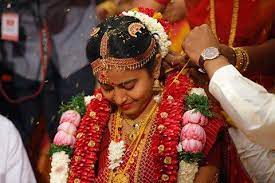How Arranged Marriages Work in Sindhi Culture

The Sindhi community is special in the diverse cultures of India. Come and discover the world of Sindhi-arranged weddings and find a Sindhi girl for marriage. They are beautiful and meaningful. Join us today to learn more about them.
1. The Significance of Arranged Marriages in Sindhi Tradition
The Sindhi people have long practised arranged marriages. Parents of the bride and groom place great importance on their roles as matchmakers for their children.
Arranged weddings are still common in Sindhi society for a variety of reasons. One explanation is that Sindhis places a strong priority on family and community. Lots of people believe that arranged marriages make sure that both people will be involved in their families and communities.
Another element contributing to the continued frequency of planned marriages is the Sindhis’ conviction that adults know what is best for their children. They believe that because the parents are older and have greater wisdom, they are better equipped to make decisions about their children’s future than the youngsters themselves.
Finally, scheduled weddings are seen as a way to preserve Sindhi tradition and culture. According to Sindhis, arranged weddings assist in guaranteeing that the pair will have the same morals and worldviews, strengthening the Sindhi community.
Accepting Tradition
Sindhi arranged marriages are a fusion of tradition and modernity in which families have a big say in who their loved ones marry. Those ties bring together families, values, and legacies. They are more than just marriage contracts.
Function of Families
When it comes to marriage arrangements, families are very significant in Sindhi culture. Parents, grandparents, and other family members collaborate to discover mates that share their beliefs, background, and objectives. The close ties that exist within the community are reflected in this cooperative strategy.
Relationships and Values
In Sindhi, arranged marriages, compatibility, shared ideals, and cultural congruence are prioritised. When families consider potential matches, they think about things like education, family background, jobs, and religious beliefs. This makes sure the marriage starts off strong.
The Customs and Holidays
Teejri: Married women fast during this pre-wedding custom to ensure their husbands’ health. It’s a beautiful event that celebrates marriage, loyalty, and love.
Pakki Mishri: This is an engagement ritual in which the families give gifts and sweets. It means the alliance officially recognizes it.
Mehndi: A colourful event where the bride’s hands and feet are decorated with elaborate henna patterns. It’s a happy lead-up to the nuptials.
Sangeet: The Sangeet ceremony brings both families together to celebrate unity and harmony through a night of music, dance, and laughter.
Wedding: The wedding ceremony combines traditional rites with contemporary components. The couple makes special promises to each other by the sacred fire to show how much they love and are committed to each other.
2. How are Arranged Marriages Changing?
Although traditional values continue to be the foundation of Sindhi arranged marriages, the strategy has changed:
Education and Independence: As times have changed, education and independence have taken on more significance. Couples are supported in following their dreams and working towards their goals, while also honouring their cultural background.
Mutual Consent: The involvement and consent of the parties are valued in contemporary Sindhi arranged marriages. They are able to express their interests and aspirations thanks to open communication.
3. Services for Sindhi Matrimonial
The gap between tradition and modernity is bridged through Sindhi matrimonial services like Telugu Matrimony:
Personalised Matches: These services pair people according to compatibility and shared values using cutting-edge algorithms and human expertise.
Counselling and Guidance: Sindhi matrimonial agencies give families advice on how to deal with the difficulties of arranged weddings while respecting the individual’s preferences.
4. The Pros and Cons of Arranged Marriages
Some of the pros of arranged marriages include:
- The couple is more likely to be compatible, as their parents have chosen them based on shared values and beliefs.
- The likelihood of divorce decreases because the pair is more dedicated to keeping the marriage together.
- When the couple has family and friends nearby, it’s more likely that they will have a strong support system.
Some of the cons of arranged marriages include:
- The choice of their spouse may not be their own.
- The couple could not be attracted to one another physically.
- The couple might not have the same passions or objectives.
- Both people might feel pressured to follow traditional gender expectations.
- The couple might not be able to form a strong emotional connection.
The following advice will help you make an arranged marriage work:
- Be receptive and eager to learn more about the person you are paired with.
- Communicate openly and honestly with each other.
- Be open to negotiating.
- Try to be understanding and patient with other people.
- You need to work hard to make your marriage successful.
There are a few things you may do if you’re seeking a Sindhi girl for marriage. You can ask your friends and family for advice. Using a matchmaking service is another option. Ask inquiries about someone’s values, beliefs, and objectives when you meet possible mates. It’s really important to get to know their family and friends too.
Finding a life companion through an arranged marriage can work. Before you start, it’s really important to do some research and gather all the information.
5. Conclusion
Sindhi arranged marriages show how culture and relationships can stay strong even when love and tradition are connected. These unions are a happy occasion where people come together because they have similar beliefs, treat each other well, and hope to be in a relationship for a long time.
We celebrate the richness of ties that span generations as we come to a close on our tour of Sindhi arranged weddings. Marriage is a story about love, trust, and working together to have a happy life. I wish happiness, understanding, and the comfort of the family for everyone starting down the path of Sindhi arranged weddings. Love has no limits, and following traditions makes it even more meaningful.
Here’s to love tales that respect the past while embracing the future till we meet again. Cheers to Sindhi arranged marriages’ precious links!
6. FAQs
Why do Sindhi families prefer arranged marriages?
Sindhis value family and community bonds, believing arranged marriages ensure active participation and preserve cultural heritage.
How do families contribute to the process?
Families collectively search for compatible matches based on values, history, and aspirations, reflecting strong community ties.
What factors are prioritised in these unions?
Sindhi arranged marriages emphasise compatibility, shared ideals, and cultural alignment, considering education, occupation, and religious beliefs.
What pre-wedding rituals are integral to Sindhi weddings?
Teejri, Pakki Mishri, Mehndi, Sangeet, and the wedding ceremony bring joy, unity, and symbolism to the celebration.
How have arranged marriages evolved?
Modern Sindhi arranged marriages embrace education, independence, and mutual consent while maintaining respect for tradition and family values.





